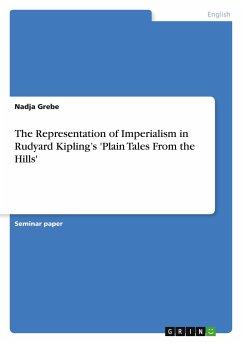Seminar paper from the year 2007 in the subject English Language and Literature Studies - Literature, grade: 1,0, Free University of Berlin (Institut für Englische Philologie), course: 20th Century Short Stories , language: English, abstract: There has been manifold discussion among Kipling critics, as far as his attitude towards imperialism is concerned. Not only that - the author's political involvement has been conceived as a disturbing factor in enjoying his literature, even complicating the appreciation of his artistic talents. Why is this so? Why do some critics find it harder to forgive Kipling his political commitment than other writers? And why is it important to scrutinise this matter at all in the first place? It looks as if the motivation here - which is probably the case with any serious enquiry of significant literature - is rooted in the desire to understand the hidden force behind the deep impression Kipling's work has obviously made on so many of his contemporaries and to come up with an answer as to whether this force is something to approve of or not. It is around this point the whole imperialism dispute seems to circle. Thus, an explanation for the controversy with which Kipling's accomplishments as a writer are discussed might to a certain extent be found in his strongly debated political attitude and his perception of reality connected with it.The following study presents a brief investigation into the question of Kipling's stance on colonialist rule as it appears in his short story Beyond the Pale. It goes without saying that only a few aspects of relevance in the context of the issue at hand can be touched upon here for the limited available space does not allow a more thorough examination. Kipling has been criticized as a crusader of colonialism, but whether this short story allows such a reading remains highly questionable and will have to be examined more closely on the following pages. Did he actually consider the work ofBritain in India a "huge, macabre joke" and only use the idea of imperialism as a kind of garment to cover his personal philosophy with or is it rather as SCHEFOLD proposes that Kipling's writing is peppered with racist and imperialist allusions, implying the notion of British racial superiority over - amongst others - India?
Hinweis: Dieser Artikel kann nur an eine deutsche Lieferadresse ausgeliefert werden.
Hinweis: Dieser Artikel kann nur an eine deutsche Lieferadresse ausgeliefert werden.








